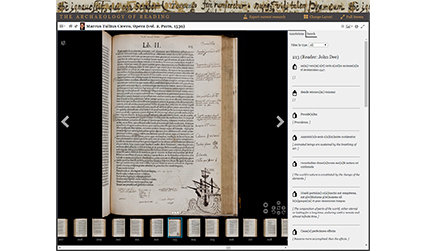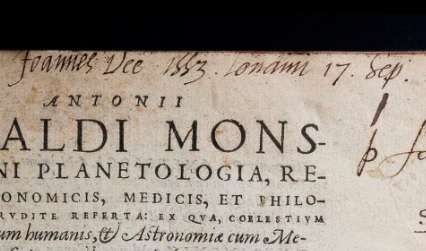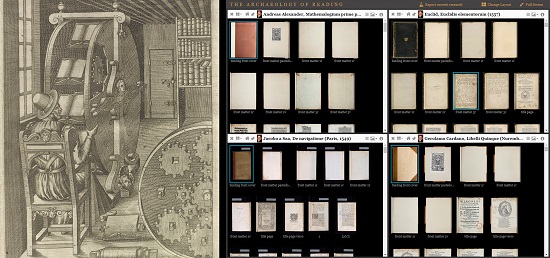The Arcaheology of Reading project has put 22 books once owned and used by the Elizabeth polymath John Dee (1527–1609) online. 12 of the books come from the RCP library. This is the first time that these extremely interesting volumes are available online for everyone to see.
As well as images of every page in each book, the project has transcribed and translated all of the annotations and notes that Dee made in the margins of his books, providing a new way to research and understand how he used his books 450 years ago.

John Dee is one of the most interesting figures from 16th century England. Dee is today most famous for his interest in the worlds of the spiritual and the occult. He believed it was possible to communicate with angels and spirits by seeing and hearing visions through a crystal ball or polished surface. He employed a number of ‘scryers’, men who purported to see visions, and carefully recorded what they said they saw.
However, he was also expert in many other subjects. Amongst other activities, he taught and wrote about mathematics, was employed as an expert astrologer to members of the aristocracy, and advised the queen about national history and colonial claims to overseas territories.
Dee had one of the largest libraries in the country during his lifetime, which he built up over many years from his student days onwards. Tragically, the library was ransacked and broken up before Dee died, while he was away from England for several years in the 1580s. Today, fragments of Dee’s book collection are preserved in libraries across the world.
The Royal College of Physicians’ library holds the largest known surviving collection of books that were once part Dee’s library. Up to 160 titles may have belonged to him, and around 100 of those show definite evidence of his ownership and use, including his annotations, his signature or both.

Some of the most interesting books in the library are to be found in the John Dee collection, so much so that we held an exhibition devoted to them in 2016. The 100+ volumes cover a wide range of topics – from Roman history to astrology – and some are now very rare. Their real magic is that many of them are heavily and enthusiastically annotated by Dee.
As of February 2019, 12 of those books have been made available online in an entirely new way by the Archaeology of Reading project: not only have all the bindings and all pages been photographed at high resolution, but Dee’s marginal notes and drawings have also been transcribed and described, and made fully searchable.

16th century handwriting isn’t always easy to read, and Dee often wrote in Latin and Greek, meaning that it’s not always easy today to understand the notes he left. This new searchable dataset provides many routes into analysing what Dee wrote, making his notes accessible to new audiences and enabling new comparisons and analyses.
The project also includes books annotated by another Elizabethan, writer and courtier Gabriel Harvey (1552–1631). The selection of 35 books in the project – contributed by libraries in the UK and USA -- are presented as a sort of modern ‘bookwheel’: a way of comparing several volumes at once, and a tool for analysing annotators’ behaviour across time and space, rather than considering a single book at the time.

Katie Birkwood, rare books and special collections librarian
The RCP book digitised for the project are:
- Andreas Alexander, Mathematlogium (1504)
- Mattheus Beroaldus, Chronicum (1575)
- Gerolamo Cardano, Libelli quinque (1547)
- Cicero, Opera (1539–40), volume 1 and volume 2
- Antoine Mizauld, Planetologia (1551)
- Ovid, Amatoria (1529)
- Matthew Paris, Flores historiarum (1570)
- Walther Ryff, In Caii Plinii Secundi Naturalis historiae argutissimi Scriptoris I. & II. Cap: Libri XXX. Commentarius (1548)
- Guillaume Postel, De originibus (1553)
- Quintilian, Institutionum oratoriarum (1540)
- Thomas Walsingham, Historia brevis (1574)
- Thomas Walshingham, Ypodigma Neustriae (1574)
All the books in the RCP John Dee collection are available for research by prior appointment in the library reading room.
